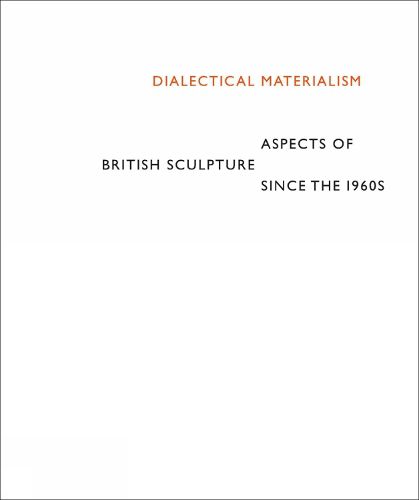Readings Newsletter
Become a Readings Member to make your shopping experience even easier.
Sign in or sign up for free!
You’re not far away from qualifying for FREE standard shipping within Australia
You’ve qualified for FREE standard shipping within Australia
The cart is loading…






Dialectical Materialism: Aspects of British Sculpture Since the 1960s charts a network of relations linking the work of six sculptors: Anthony Caro, Barry Flanagan, Richard Long, William Turnbull, Rachel Whiteread and Alison Wilding. Since the 1960s, successive artists and art-critical frameworks have sought to undermine or dispense with traditional media and the boundaries between painting and sculpture, the core disciplines of modern Western art. The artists studied here are united by their commitment to sculpture as a distinct practice, but also to broadening, challenging and redefining the basis of that practice. In his essay, art historian Jonathan Vernon argues that each of these sculptors has engaged in a realignment of sculptural and material space
in removing sculpture from the disembodied, ‘disinterested’ spaces of mid-century modernism and returning it to a shared world inhabited by other objects, ourselves and our material interests. From the conflicts that inhere in this space, we may discern the outlines of a new idea of British sculpture since the 1960s
an idea by turns narrative, dramatic and dysfunctional. AUTHORS: Dr Jonathan Vernon is an Associate Lecturer at the Courtauld Institute of Art, London and a specialist on Constantin Brancu?i and Cold War-era interpretations of twentieth-century modernism. He was previously a Fellow at The Metropolitan Museum of Art, New York and Contributing Editor at The Burlington Magazine. Dr Jon Wood is an art historian and curator specialising in modern and contemporary sculpture, and a trustee of the Gabo Trust for Sculpture Conservation. He worked for 20 years at the Henry Moore Institute, running its research programme and organising exhibitions. Tom Rowland is Managing Director of Karsten Schubert London. SELLING POINTS: . Published to accompany the last (posthumous) exhibition by gallerist Karsten Schubert . Focuses on the relations linking the work of six prominent sculptors: Anthony Caro, Barry Flanagan, Richard Long, William Turnbull, Rachel Whiteread and Alison Wilding . Analyses the ways these artists are both embedded within the sculptural tradition and have also broadened and redefined that practice . Identifies a sculptural shift from the formal and detached spaces of modernism to a world inhabited by other objects and forces as well as humans 22 colour illustrations
$9.00 standard shipping within Australia
FREE standard shipping within Australia for orders over $100.00
Express & International shipping calculated at checkout
Dialectical Materialism: Aspects of British Sculpture Since the 1960s charts a network of relations linking the work of six sculptors: Anthony Caro, Barry Flanagan, Richard Long, William Turnbull, Rachel Whiteread and Alison Wilding. Since the 1960s, successive artists and art-critical frameworks have sought to undermine or dispense with traditional media and the boundaries between painting and sculpture, the core disciplines of modern Western art. The artists studied here are united by their commitment to sculpture as a distinct practice, but also to broadening, challenging and redefining the basis of that practice. In his essay, art historian Jonathan Vernon argues that each of these sculptors has engaged in a realignment of sculptural and material space
in removing sculpture from the disembodied, ‘disinterested’ spaces of mid-century modernism and returning it to a shared world inhabited by other objects, ourselves and our material interests. From the conflicts that inhere in this space, we may discern the outlines of a new idea of British sculpture since the 1960s
an idea by turns narrative, dramatic and dysfunctional. AUTHORS: Dr Jonathan Vernon is an Associate Lecturer at the Courtauld Institute of Art, London and a specialist on Constantin Brancu?i and Cold War-era interpretations of twentieth-century modernism. He was previously a Fellow at The Metropolitan Museum of Art, New York and Contributing Editor at The Burlington Magazine. Dr Jon Wood is an art historian and curator specialising in modern and contemporary sculpture, and a trustee of the Gabo Trust for Sculpture Conservation. He worked for 20 years at the Henry Moore Institute, running its research programme and organising exhibitions. Tom Rowland is Managing Director of Karsten Schubert London. SELLING POINTS: . Published to accompany the last (posthumous) exhibition by gallerist Karsten Schubert . Focuses on the relations linking the work of six prominent sculptors: Anthony Caro, Barry Flanagan, Richard Long, William Turnbull, Rachel Whiteread and Alison Wilding . Analyses the ways these artists are both embedded within the sculptural tradition and have also broadened and redefined that practice . Identifies a sculptural shift from the formal and detached spaces of modernism to a world inhabited by other objects and forces as well as humans 22 colour illustrations